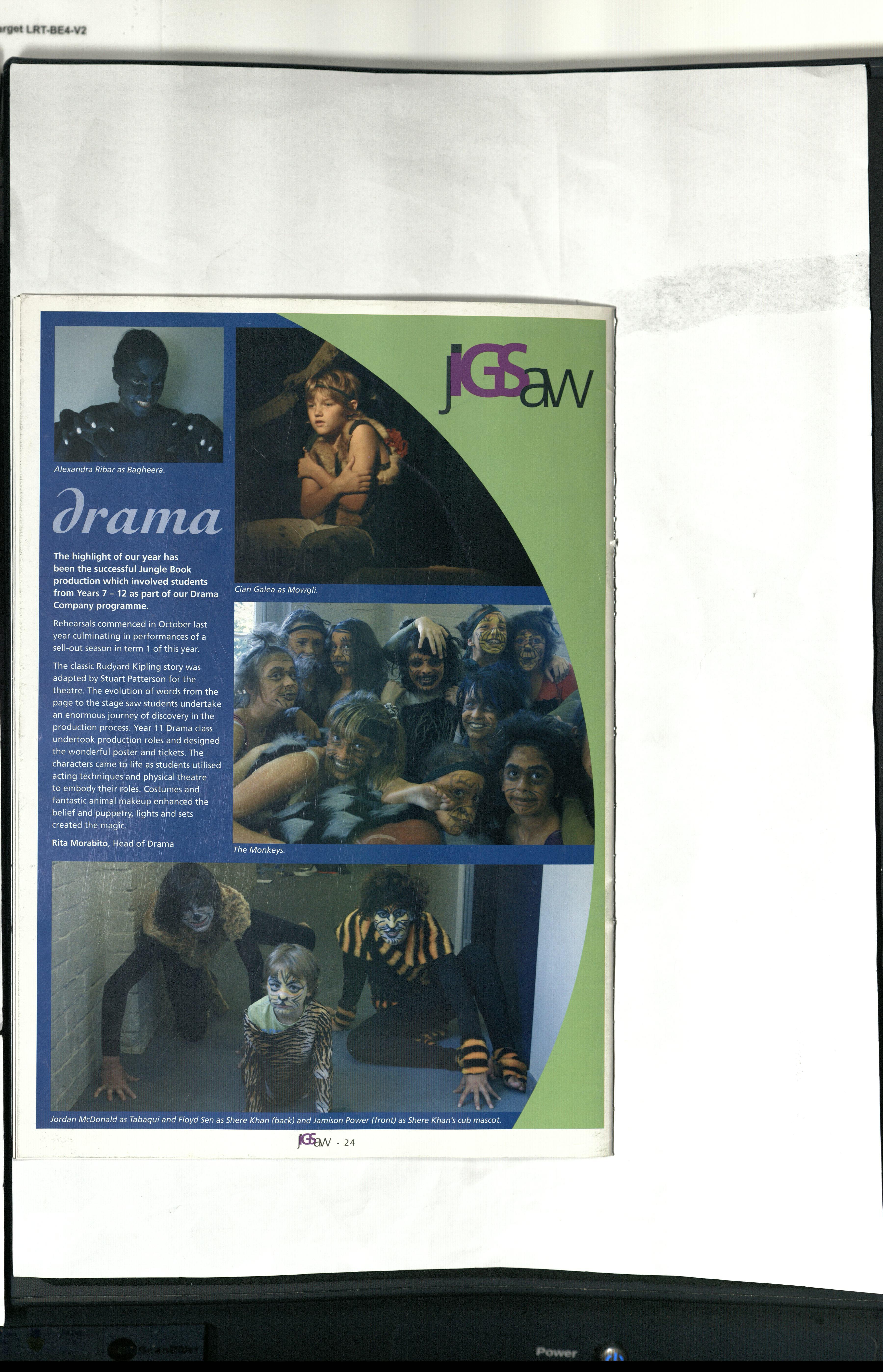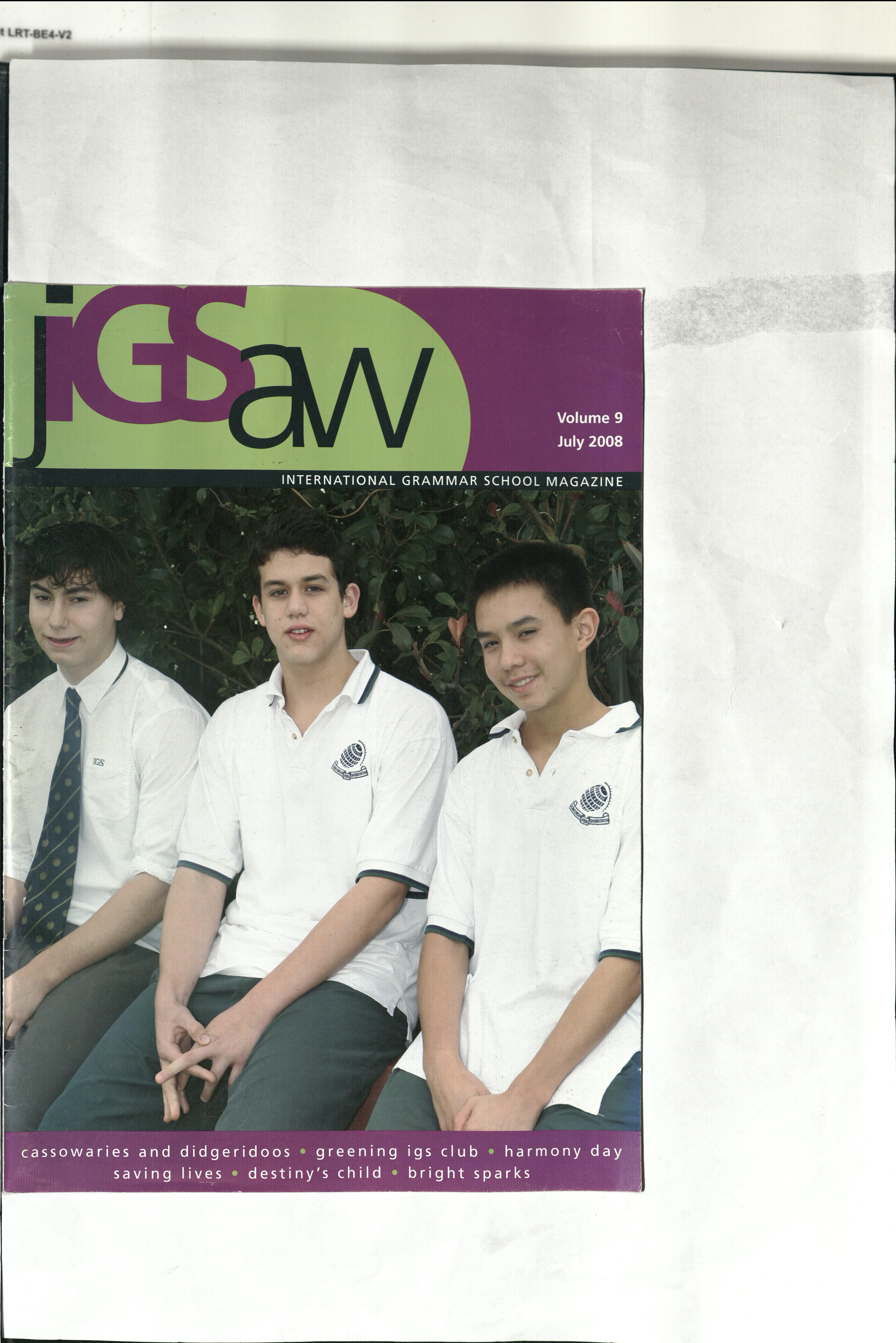

from the • cipal
As a Principal I am proudest when I farewell Year 12 students knowing that they leave IGS ready to step onto their next stage as optimistic, hopeful, caring individuals, well-educated, creative, compassionate and yet humble.
We want each of our students to be the best person they can be rather than mere passive consumers of culture. We want passion, active engagement with society and mature thinking. I know we have been successful when students take the initiative to act on their beliefs and values, and strive to improve their world.
At the Happiness and its Causes Conference in Sydney in May this year, speakers led the audience through two days of analysis of scientific, medical, psychological and spiritual understandings of happiness. The messages were clear: happiness is not an experience but a way of being. It is a way of being that gives the resources to deal with the ups and downs of life. Genuine happiness is a sense of wellbeing, a sense of being right with the world that is not dependent upon pleasant external stimuli but arises from quality of life, mental balance and knowing reality as it is. Ultimately there must be a sense of purpose, and thus a sense of achievement and some degree of altruism, as happiness comes largely as a bi-product of giving to others.
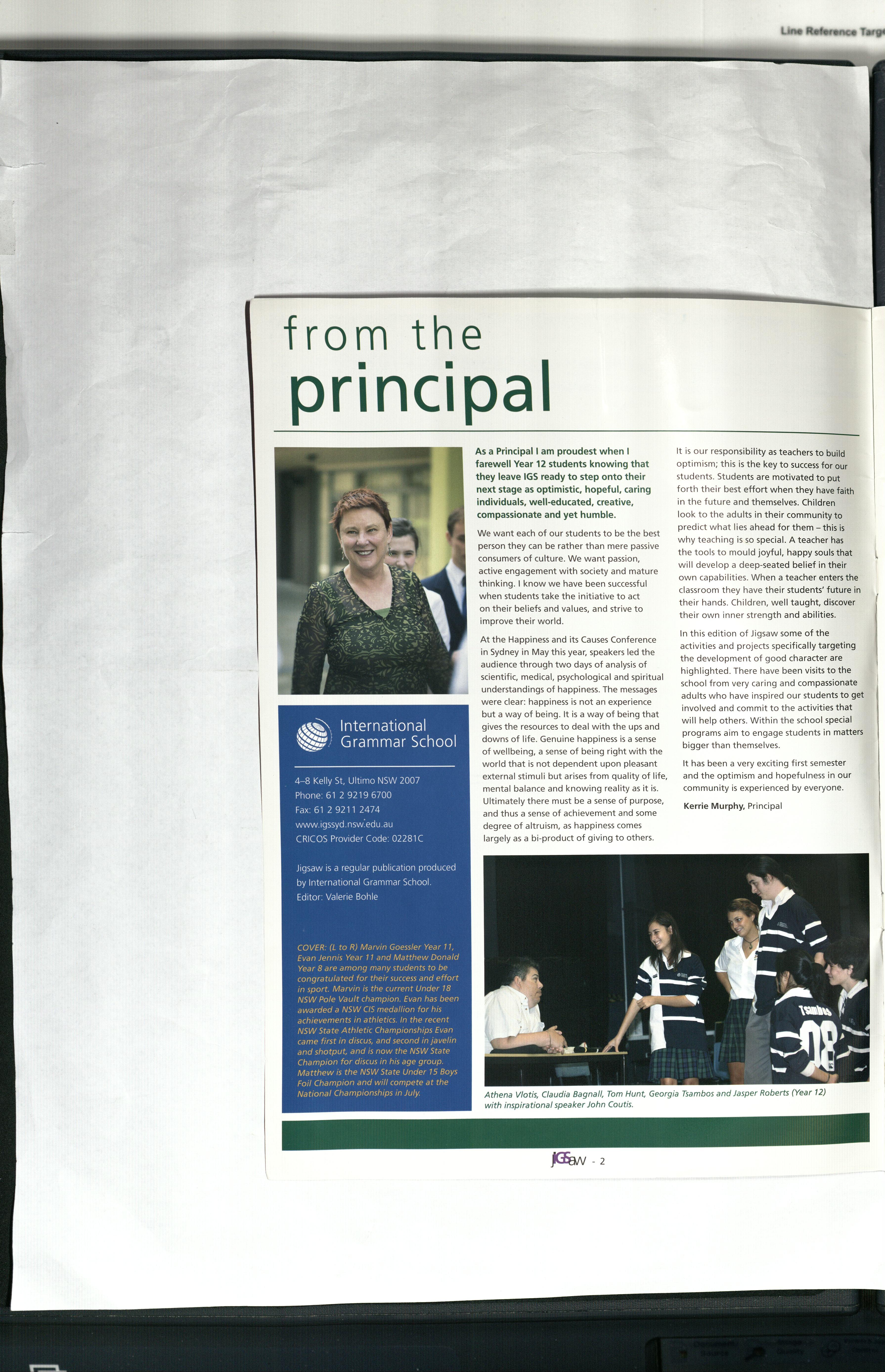
It is our responsi b i lity as teachers to build optimism; this is t he key to success for our students. Students are motivated to put forth their best effort when they have faith in the future and th emselves Children look to the adults in thei r community to predict what lies ahead for them- this is why teaching is so speci al. A teacher has the tools to mould joyful , happy souls that will develop a deep-se ated belief in their own capabilities When a teacher enters the classroom they have their students' future in their hands. Children, well taught, discover their own inner strength and abilities.
In this edition of Jigsaw some of the activities and projects spec ifically targeting the development of good chara cter are highlighted. There have been visits to the school from very caring and compa ssionate adults who have inspired our stude nts to get involved and commit to the activiti es that will help others. Within the school special programs aim to engage students in matters bigger than themselves.
It has been a very exciting first semest er and the optimism and hopefulness in our community is experienced by everyone.
Kerrie Murphy, Principal
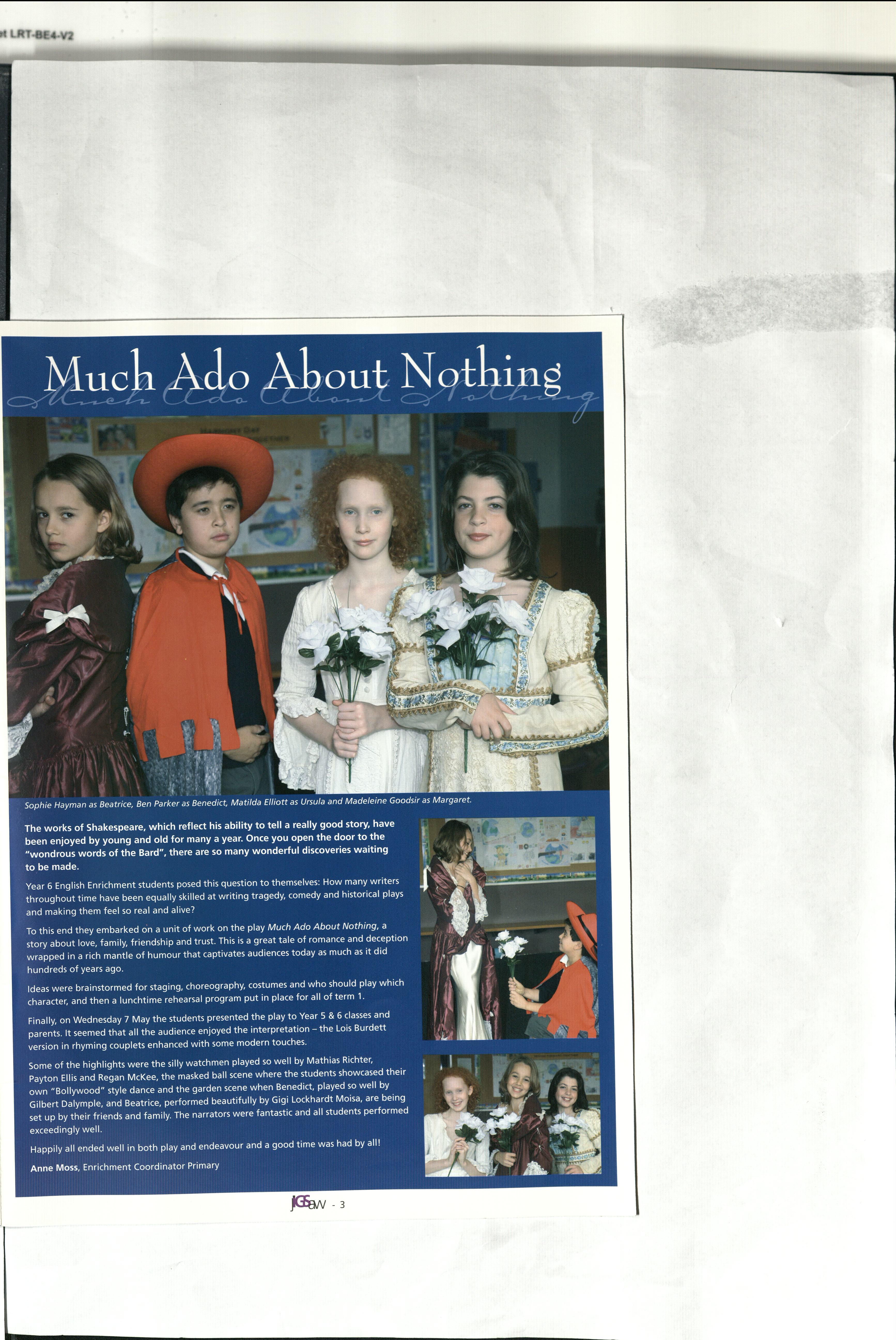
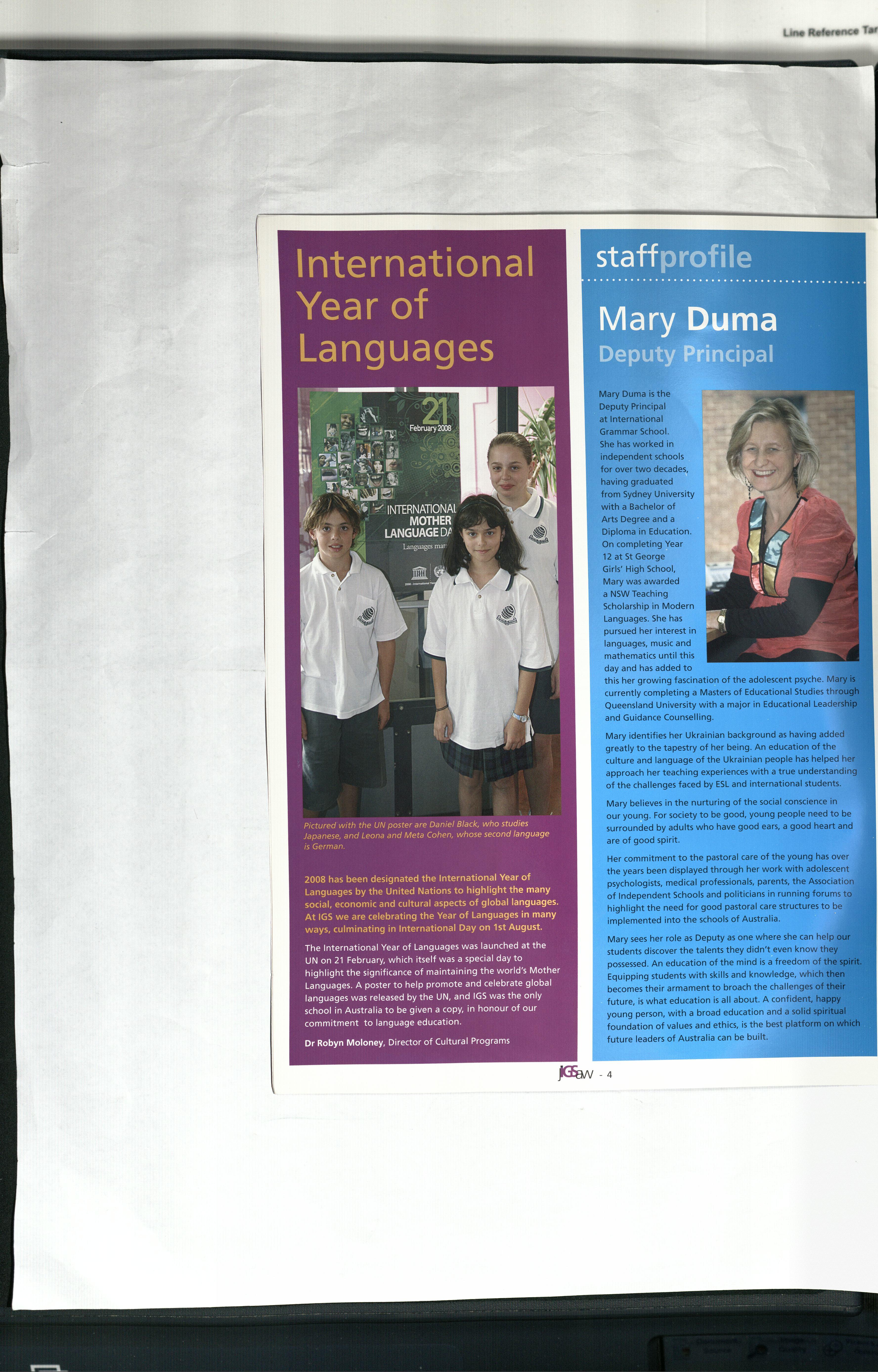
Mary Duma is the Deputy Principal at International Grammar School. She has worked in independent schools for over two decades having graduated from Sydney University with a Bachelor of Arts Degree and a Diploma in Education On completing Year 12 at St George Girls' High School, Mary was awarded a NSW Teaching Scholarship in Modern Languages. She has pursued her interest in languages, music and mathematics until this day and has added to this her growing fascination of the adolescent psyche. currently completing a Masters of Educational Studies Queensland University with a major in Educational and Guidance Counselling.
Mary identifies her Ukrainian background as having greatly to the tapestry of her being. An education of the culture and language of the Ukrainian people has helped approach her teaching experiences with a true unort<>r<:t;:onrtiin of the challenges faced by ESL and international students Mary believes in the nurturing of the social conscience in our young. For society to be good, young people need to be surrounded by adults who have good ears, a good heart and are of good spirit.
Her commitment to the pastoral care of the young has over the years been displayed through her work with adolescent psychologists, medical professionals, parents, the As!;ociiatio, of Independent Schools and politicians in running forums highlight the need for good pastoral care structures to implemented into the schools of Australia.
Mary sees her role as Deputy as one where she can students discover the talents they didn't even know possessed. An education of the mind is a freedom Equipping students with skills and knowledge, becomes their armament to broach the chal future, is what education is all about. A rnr\Tit1l<>n1 young person, with a broad education and a foundation of values and ethics, is the best future leaders of Australia can be built.
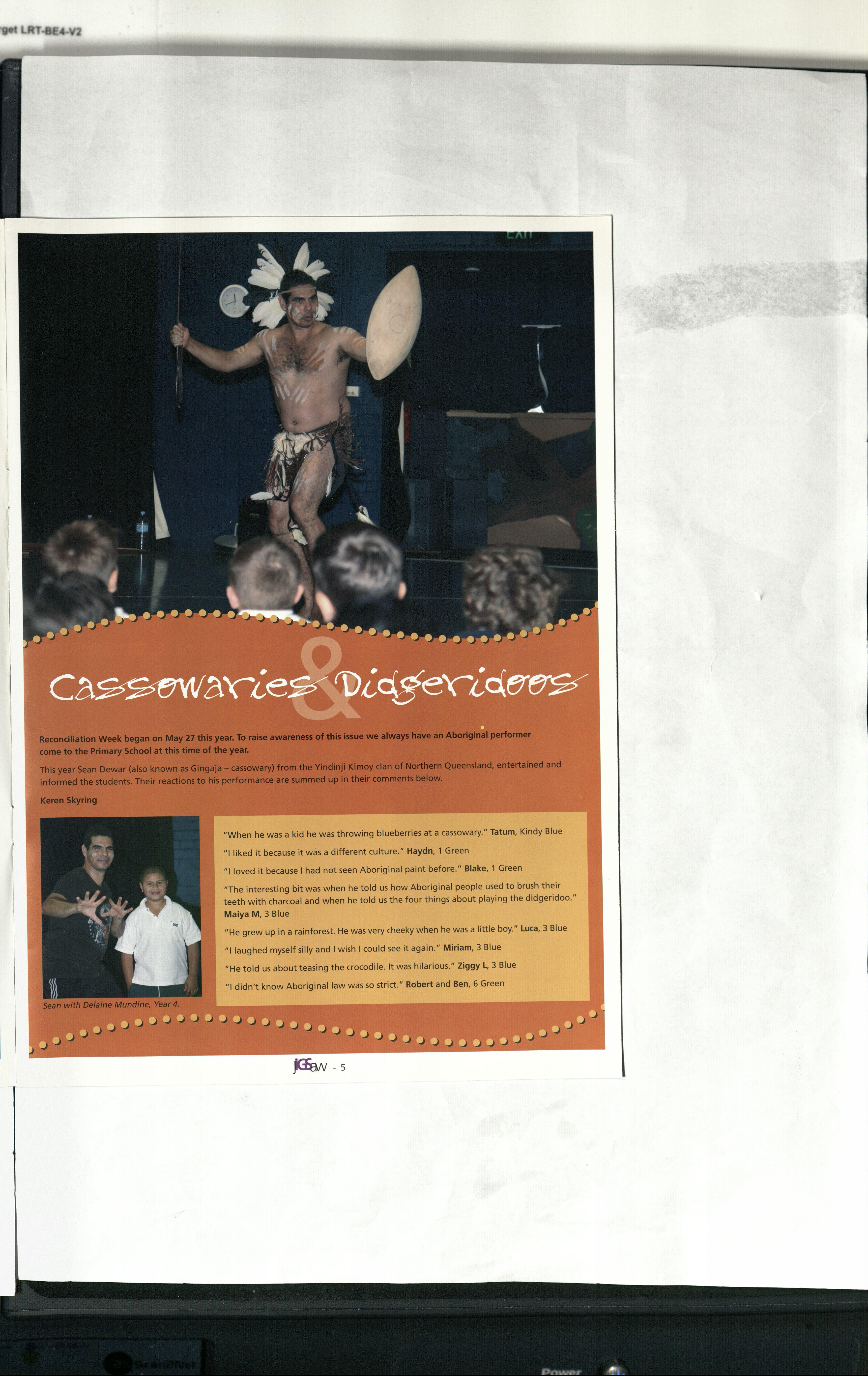
"When he was a kid he was throwing blueberries at a cassowary." Tatum , Kindy Blue
"I liked it because it was a different culture." Haydn, 1 Green
"I loved it because I had not seen Aboriginal paint before " Blake, 1 Green
"The interesting bit was when he told us how Aboriginal people used to brush their teeth with charcoal and when he told us the four things about playing the didgeridoo " Maiya M, 3 Blue
"He grew up in a rainforest He was very cheeky when he was a little boy." Luca, 3 Blue
"I laughed myself silly and I wish I could see it again " Miriam, 3 Blue
"He told us about teasing the crocodile. It was hilarious." Ziggy L, 3 Blue
"I didn't know Aboriginal law was so strict." Robert and Ben, 6 Green
of these programs is the Literacy project, with which IGS is now rM:>IV,ec:l. Working through schools in remote in which there can be up to illiteracy, no libraries or bookshops, the Uteracy backpacks are filled with reading material for a whole family and contain children's books, womens' magazines, sports magazines and indigenous newspapers. The backpacks put books into homes, and adults and children can read together, and access health information and news.
Jeff explained that the significance year's extra education and literacy for young mother, for example, extends life of her child by 4 years, and reduces infant mortality by 7-10%. Helping literacy and education is closing the gap between schools and communities. IGS students are reading 5 books and bri in a $5 donation to raise funds for the Backpack project.
Dr Robyn Moloney, Director of Programs
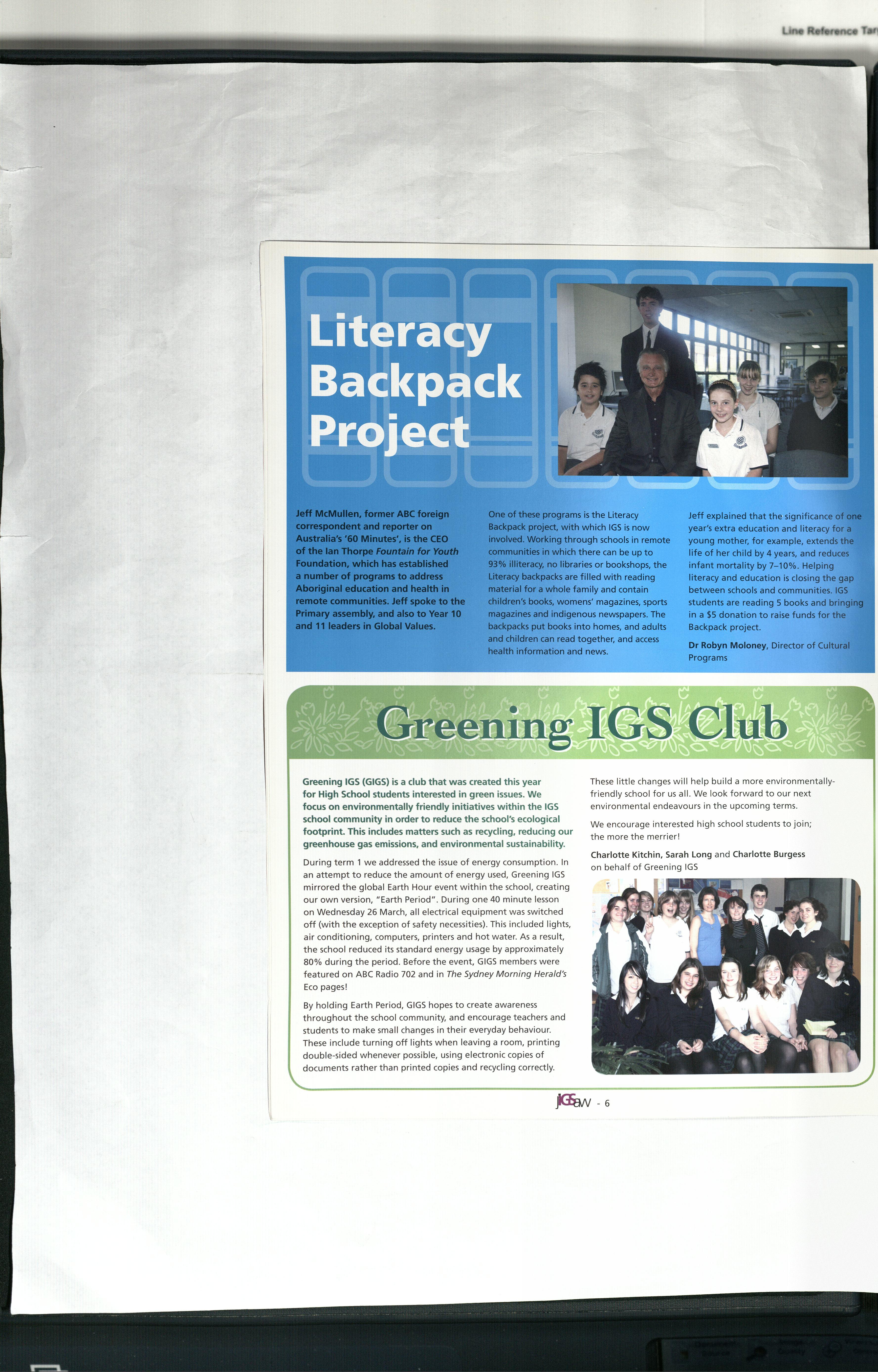
Greening IGS (GIGS) is a club that was created this year for High School students interested in green issues. We focus on environmentally friendly initiatives within the IGS school community in order to reduce the school's ecological footprint. This includes matters such as recycling, reducing our greenhouse gas emissions, and environmental sustainability.
During term 1 we addressed the issue of energy consumption. In an attempt to reduce the amount of energy used, Greening IGS mirrored the global Earth Hour event within the school, creating our own version, "Earth Period". During one 40 minute lesson on Wednesday 26 March, all electrical equipment was switched off (with the exception of safety necessities). This included lights, air conditioning, computers, printers and hot water As a result, the school reduced its standard energy usage by approximately 80% during the period. Before the event, GIGS members were featured on ABC Radio 702 and in The Sydney Morning Herald's Eco pages!
By holding Earth Period, GIGS hopes to create awareness throughout the school community, and encourage teachers and students to make small changes in their everyday behaviour These include turning off lights when leaving a room, printing double-sided whenever possible, using electronic copies of documents rather than printed copies and recycling correctly
These little changes will help build a more environmentallyfriendly school for us all. We look forward to our next environmental endeavours in the upcoming terms
We encourage interested high school students to join; the more the merrier!
Charlotte Kitchin, Sarah Long and Charlotte Burgess on behalf of Greening IGS
Year 4 to 12 students were addressed by inspirational speaker John Coutis during term 1. For a little man he brought with him a very big message:
"We live in a world that travels at a warp speed Time has become our most valuable commodity
Today, people say and do rather nasty things towards each other almost without a second thought I feel one of the worst things today is propelling destructive and hurtful language back and forward between people without thinking, whether it is a classroom, on the playing field, in an office cubicle or across a dinner table.
As you can imagine, I have had many things said to me over my lifetime. I can at times be ignorant of language, its use and the barriers it can cause. It has been important for me not to pay attention to what people have said to me, from an early age right through to today. If I had listened to the destructive and hurtful language tossed my way through ignorance, lack of kindness or lack of knowledge, I would not have achieved the things I have done or be where I am today.
Blocking out the negatives has been a full time job for me. My focus has been on achieving and doing what most said I could not do This does not mean to say that things that have been said to me
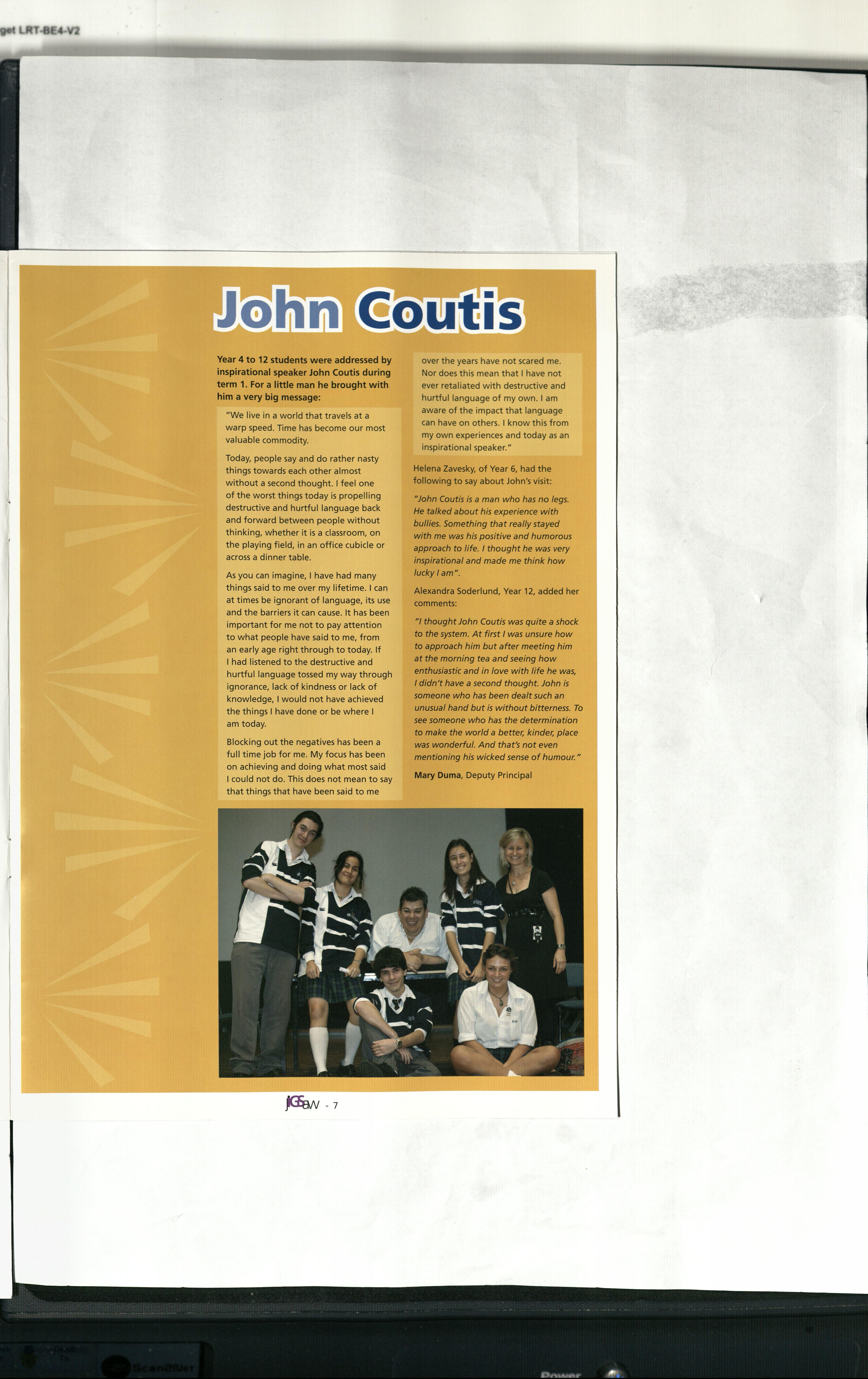
over the years have not scared me. Nor does this mean that I have not ever retaliated with destructive and hurtful language of my own. I am aware of the impact that language can have on others. I know this from my own experiences and today as an inspirational speaker."
Helena Zavesky, of Year 6, had the following to say about John 's visit:
"John Coutis is a man who has no legs. He talked about his experience with bullies. Something that really stayed with me was his positive and humorous approach to life. I thought he was very inspirational and made me think how lucky I am"
Alexandra Soderlund, Year 12, added her comments:
"I thought John Coutis was quite a shock to the system. At first I was unsure how to approach him but after meeting him at the morning tea and seeing how enthusiastic and in love with life he was, I didn't have a second thought. John is someone who has been dealt such an unusual hand but is without bitterness. To see someone who has the determination to make the world a better, kinder, place was wonderful. And that's not even mentioning his wicked sense of humour."
Mary Duma, Deputy Principal
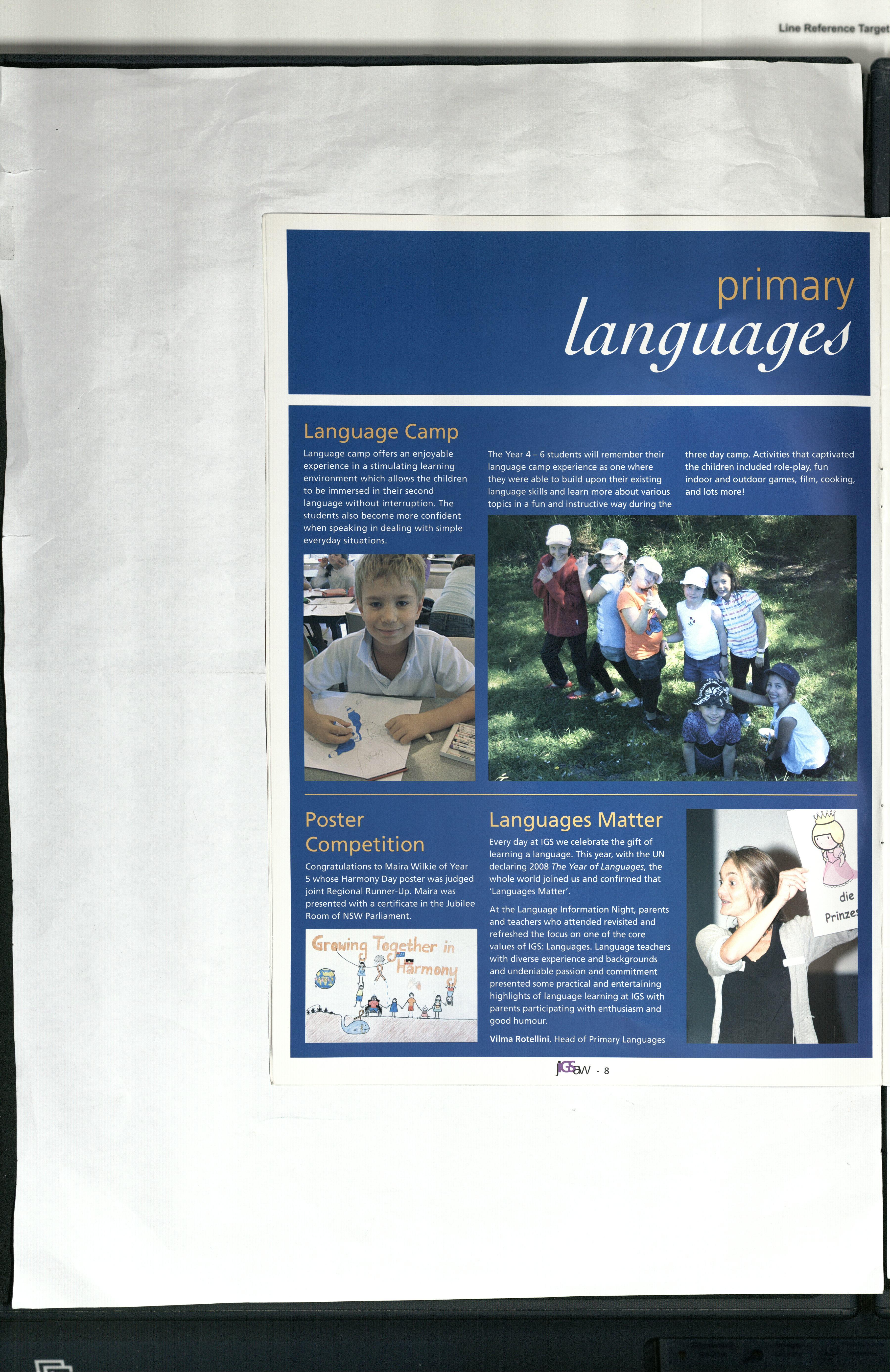
On Hannony Day as a class we discussed what hannony means to people In .-..1 and what things we need to have for hannony to exist.
We read the book A Life Like Mine- Children Around the World, a book that records the optimism of children all over the world. The book is a UNICEF 'fUnded project. As a class we then talked about all the topics the book raised and how basic needs such as food, water and homes were met in our lives.
The students loved learning all about each others' cultural backgrounds and how grandparents played such a role in bringing difference into our homes.
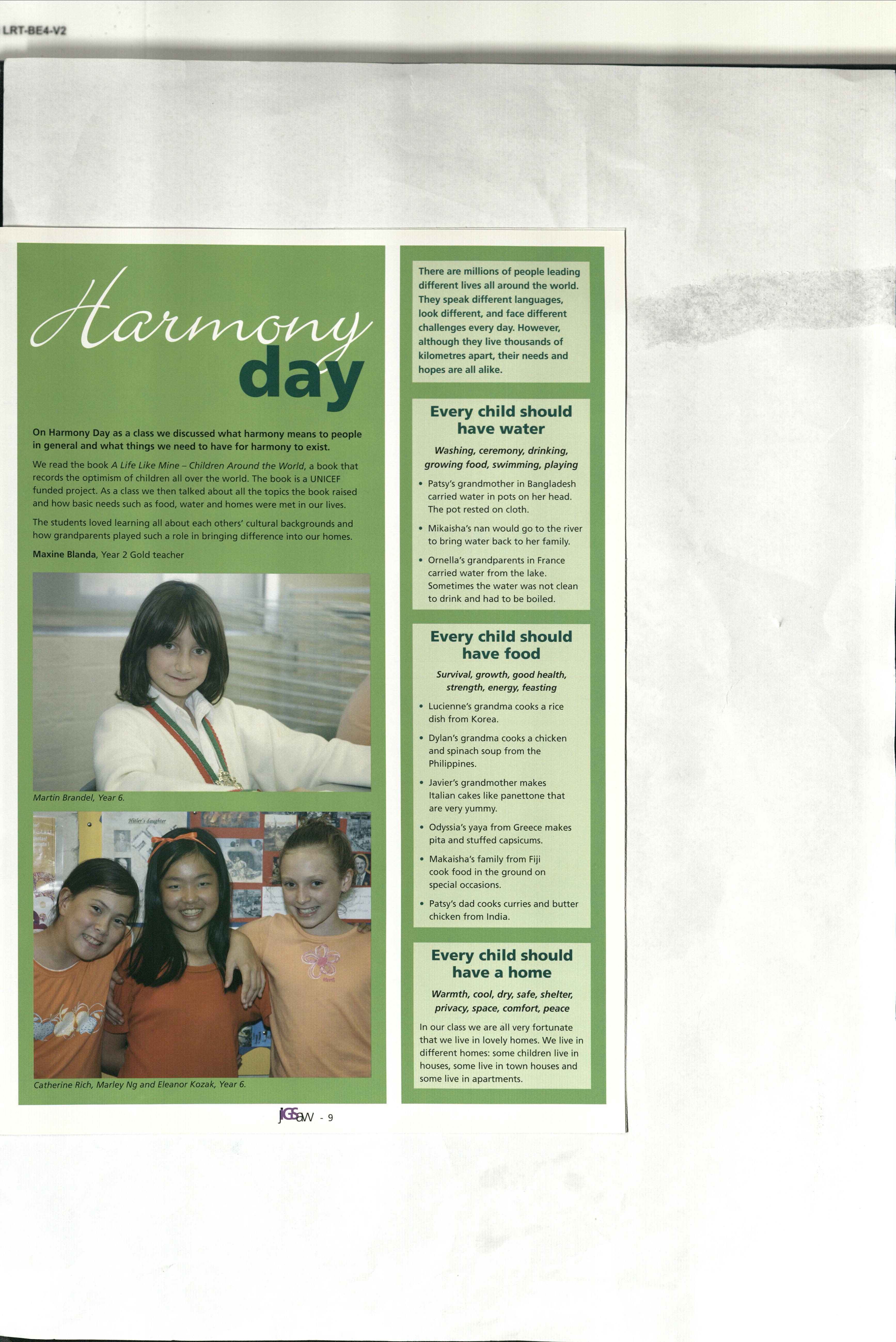
There are millions of people leading different lives all around the world. They speak different languages, look different, and face different challenges every day. However, although they live thousands of kilometres apart, their needs and hopes are all alike.
Every child should have water
Washing, ceremony, drinking, growing food, swimming, playing
• Patsy's grandmother in Bangladesh carried water in pots on her head. The pot rested on cloth.
• Mikaisha's nan would go to the river to bring water back to her family.
• Omelia's grandparents in France carried water from the lake. Sometimes the water was not clean to drink and had to be boiled.
Every child should have food
Survival, growth, good health, strength, energy, feasting
• Lucienne's grandma cooks a rice dish from Korea.
• Dylan's grandma cooks a chicken and spinach soup from the Philippines
• Javier's grandmother makes Italian cakes like panettone that are very yummy.
• Odyssia's yaya from Greece makes pita and stuffed capsicums
• Makaisha's family from Fiji cook food in the ground on special occasions.
• Patsy's dad cooks curries and butter chicken from India
Every child should have a home
Warmth, cool, dry, safe, shelter, privacy, space, comfort, peace
In our class we are all very fortunate that we live in lovely homes. We live in different homes: some children live in houses, some live in town houses and some live in apartments.
Maxifte Blanda, Year 2 Gold teacher
Martin Brandel, Year 6.
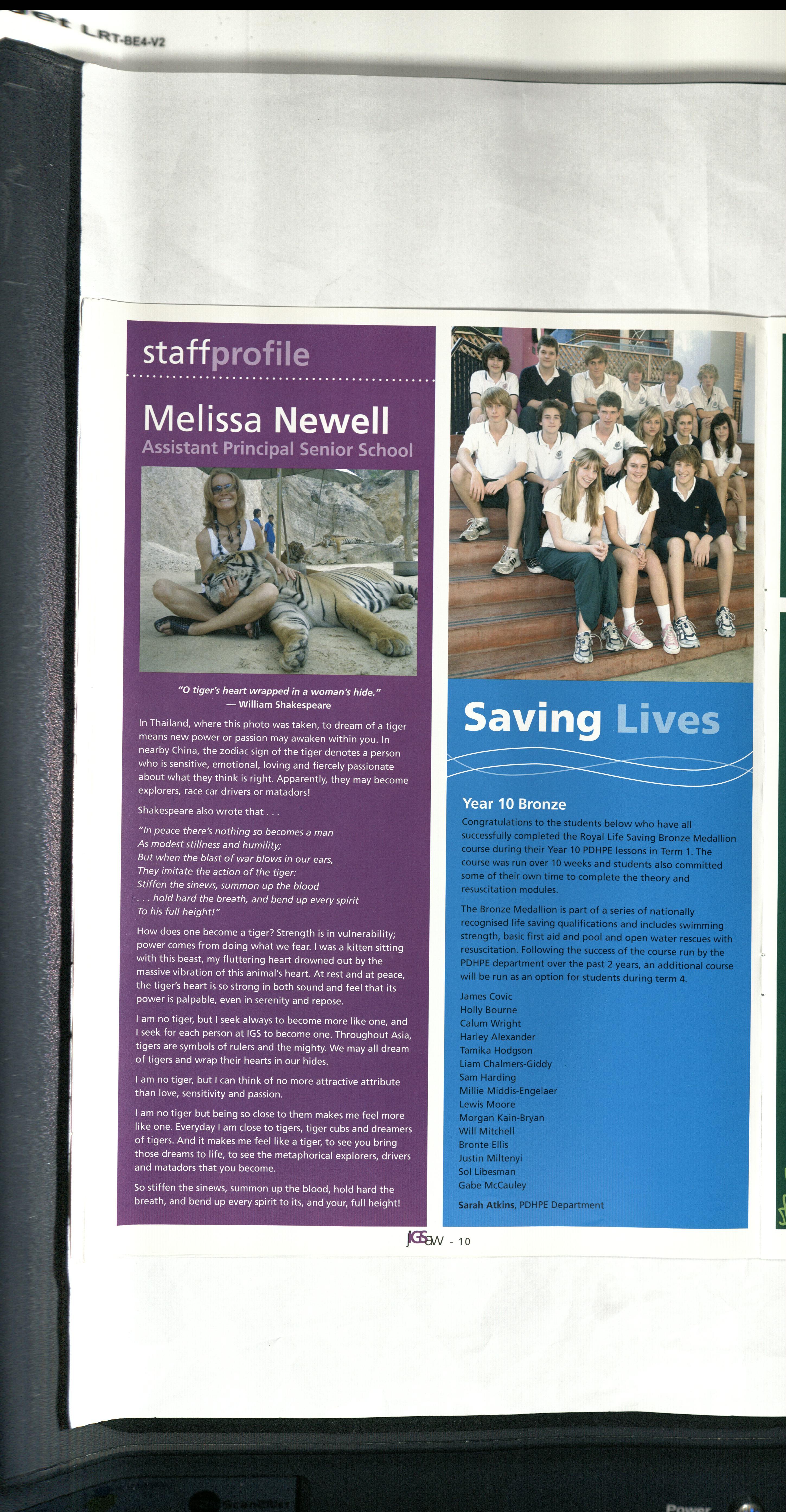
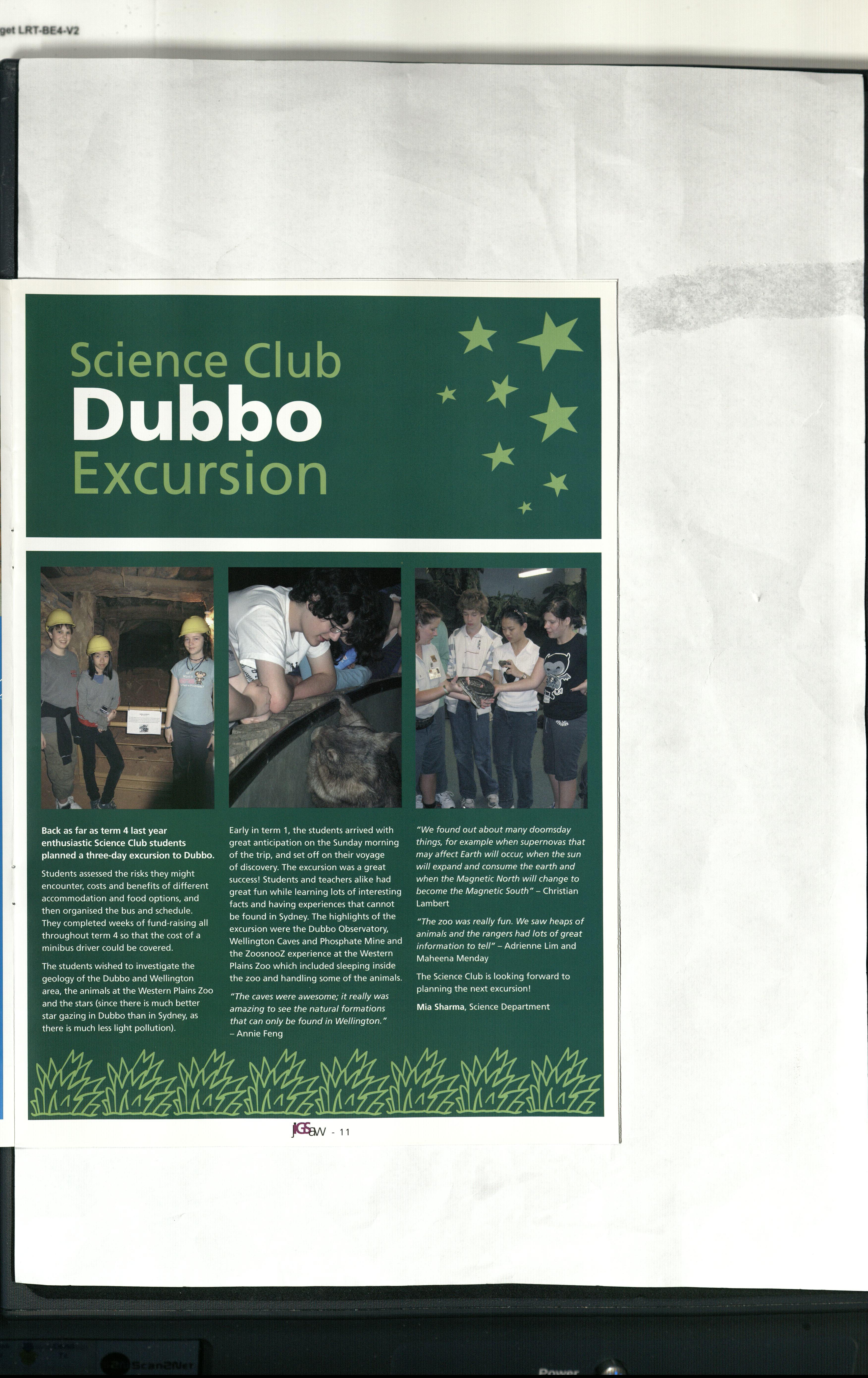
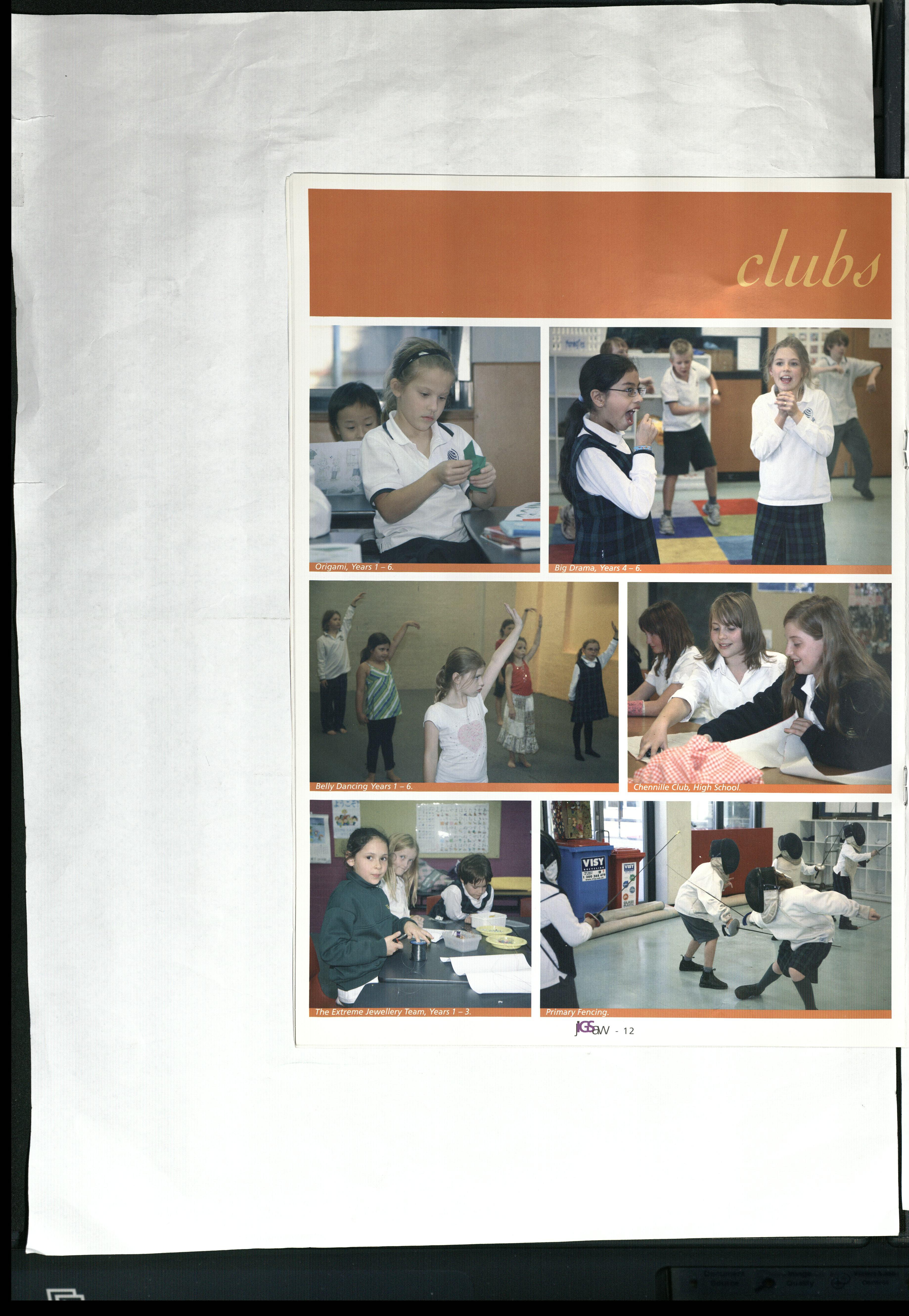
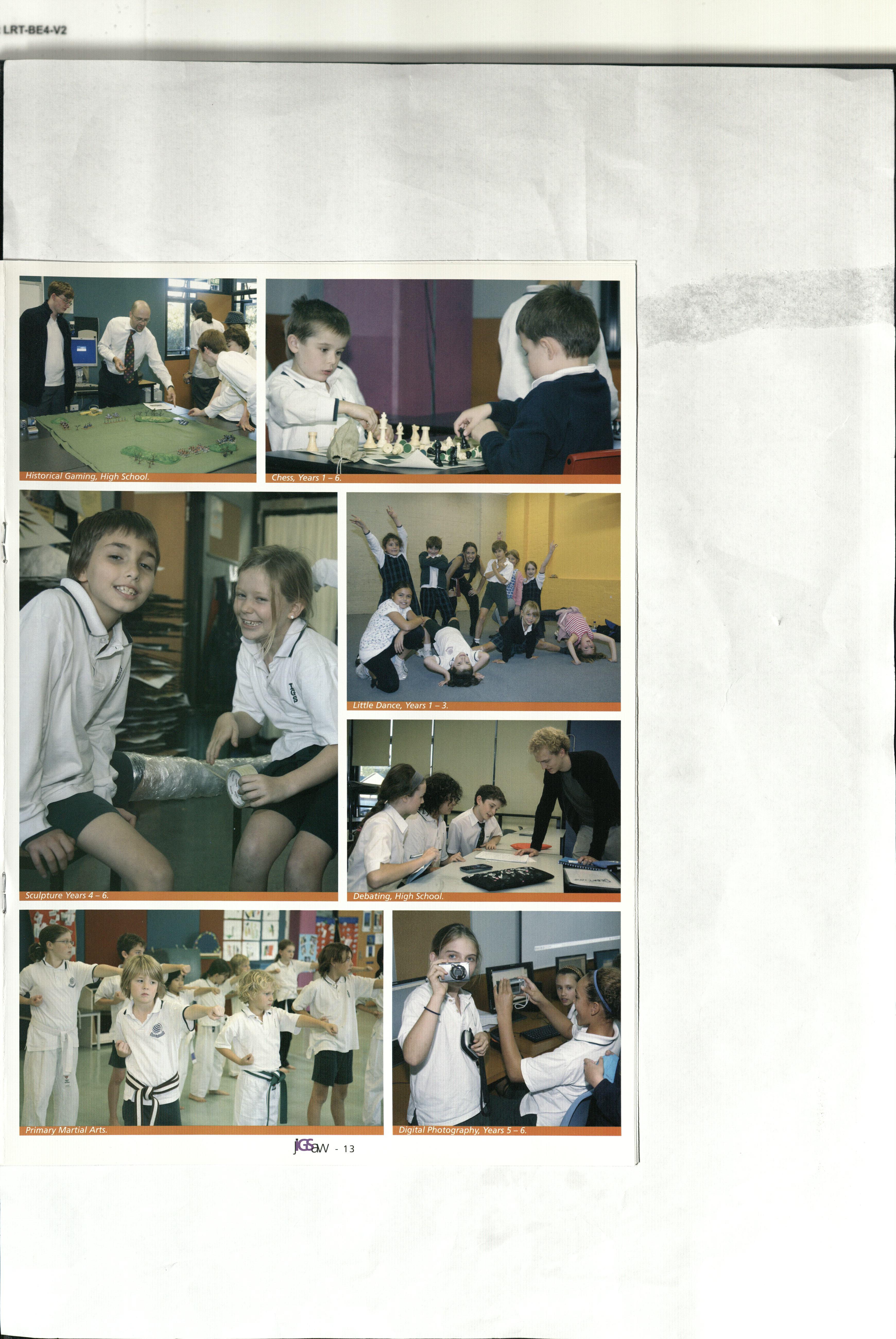
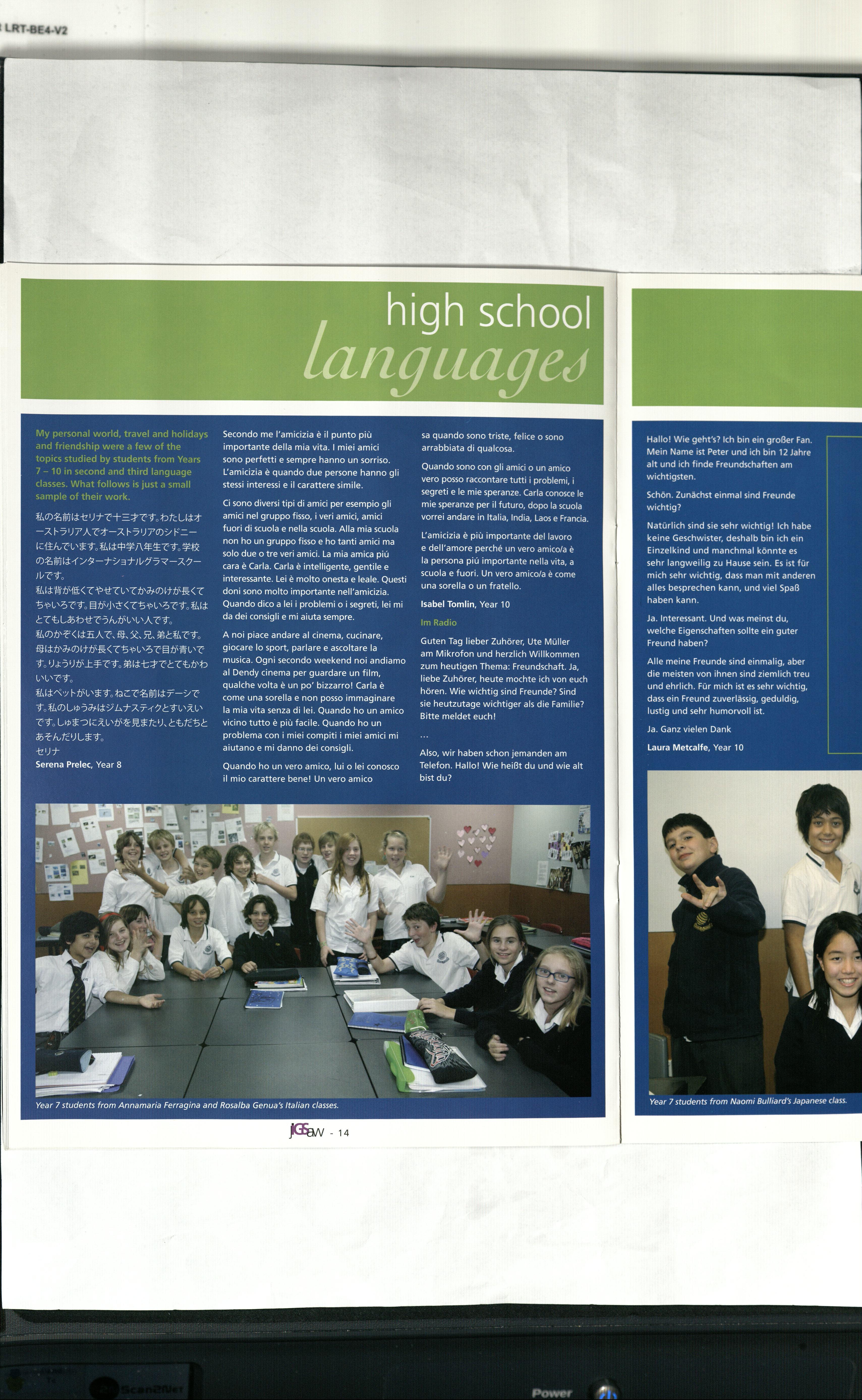
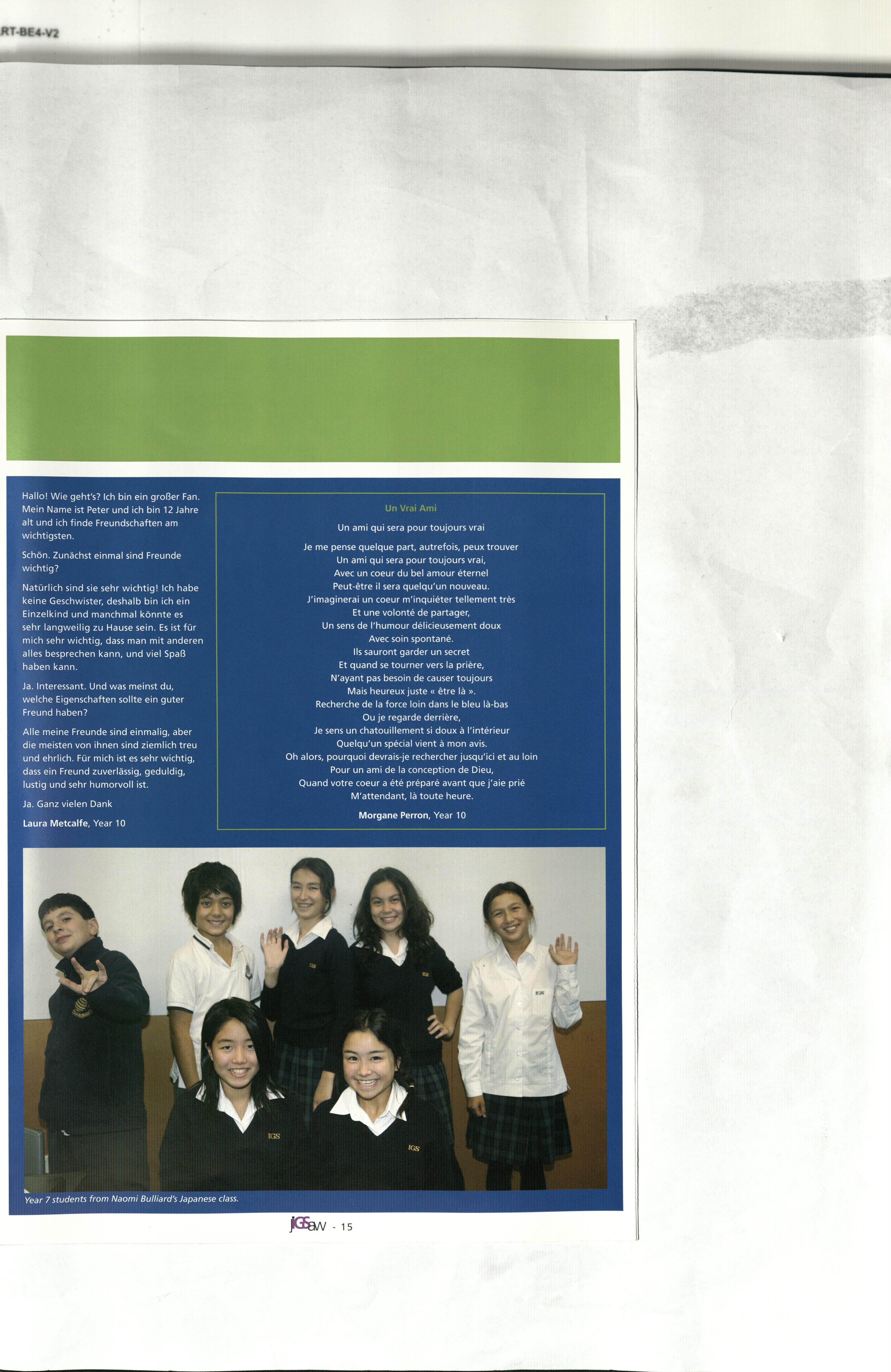
exchange
It has now become an annual tradition at IGS to farewell an excited group of young travellers from Sydney airport bound for a European country or Japan. Last year was no exception. Thirteen students spent six weeks in Rovereto, Montpellier and at our new sister school in Badsalzuflen Germany. Seven students also spent three weeks in Japan accompanied by Tom Nishino. Each year our students return to tell us of their unique and rewarding experiences.
Japan
In December 2007 a small group of Japanese students visited the city of Morioka, Japan. We spent 2 nights in Tokyo shopping and visiting the cultural sights before riding the bullet train to Morioka where we stayed with host families and attended school for two weeks. During this time we also visited the golden temple, saw snow and experienced several Japanese activities both in and out of school. Throughout the two weeks we made many new friends and tasted many traditional Japanese foods. We were also fortunate enough to be invited to take part in a Japanese tea ceremony where we tried Japanese sweets. The Japanese students welcomed us into their community and kindly offered us a tour of the school and its many facilities, where we found that they had an observatory and many other clubs including archery and swimming.
Overall each student had a fantastic time and found exchange to be an excellent learning experience from which we all can take life-long memories. We advise all language students to take the opportunity to go on exchange.
Alexander Weedon-Newstead and Samantha Roberts, Year 10
Italy
During the summer holidays, five of us travelled to Italy and lived with a host family in a small Italian town for six weeks It was a fantastic opportunity! Our language skills improved hugely and we made friends we will keep forever It was very rewarding and fun to experience another culture and way of life (not to mention the food!). We are all now, more than ever, aware of the benefits that come with the knowledge of a second language. It has opened up new windows of opportunity for us to one day confidently work and study in Italy.
Jemima Skelley and Stella Egan-Soeterboek, Year 11
Germany
On December 3 last year, Isabella Kearney-Nurse , Jessica Long and I set off for Badsalzuflen in Germany and possibly had one of the best cultural, social and academic experiences of our lives. We found that being immersed in the German language and included in jovial, idle conversation taught us how to speak better than any amount of lessons we've had The whole exchange program was extremely character building.
My time in Germany allowed me to mature and changed my outlook on life I highly recommend the exchange program to anyone who is looking to learn more about another culture and language and is not afraid of change.
Georgia Christian, Year 11
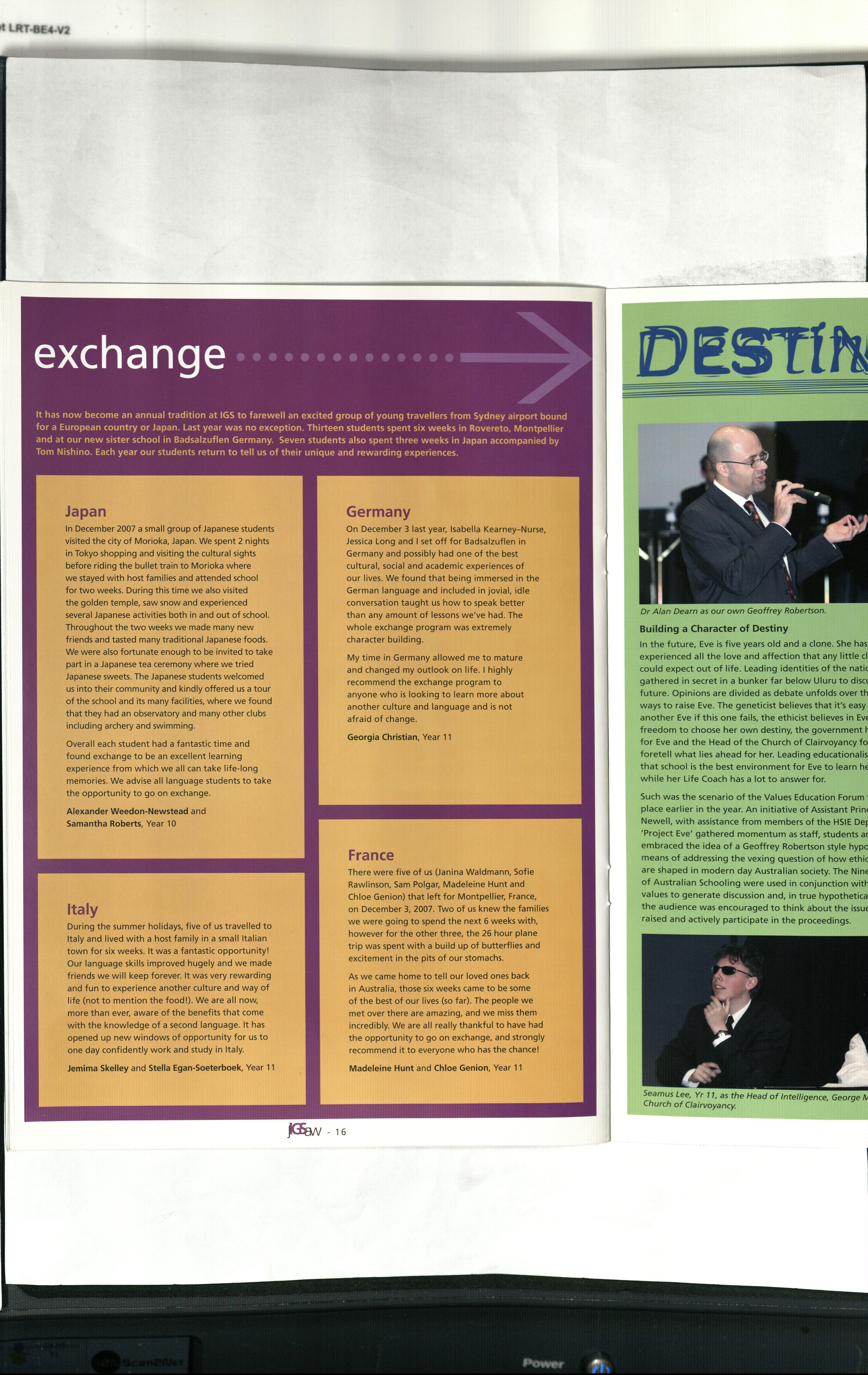
France
There were five of us (Janina Waldmann, Sofie Rawlinson, Sam Polgar, Madeleine Hunt and Chloe Genion) that left for Montpellier, France, on December 3, 2007 Two of us knew the families we were going to spend the next 6 weeks with, however for the other three, the 26 hour plane trip was spent with a build up of butterflies and excitement in the pits of our stomachs.
As we came home to tell our loved ones back in Australia, those six weeks came to be some of the best of our lives (so far) The people we met over there are amazing, and we miss them incredibly We are all really thankful to have had the opportunity to go on exchange, and strongly recommend it to everyone who has the chance!
Madeleine Hunt and Chloe Genion, Year 11
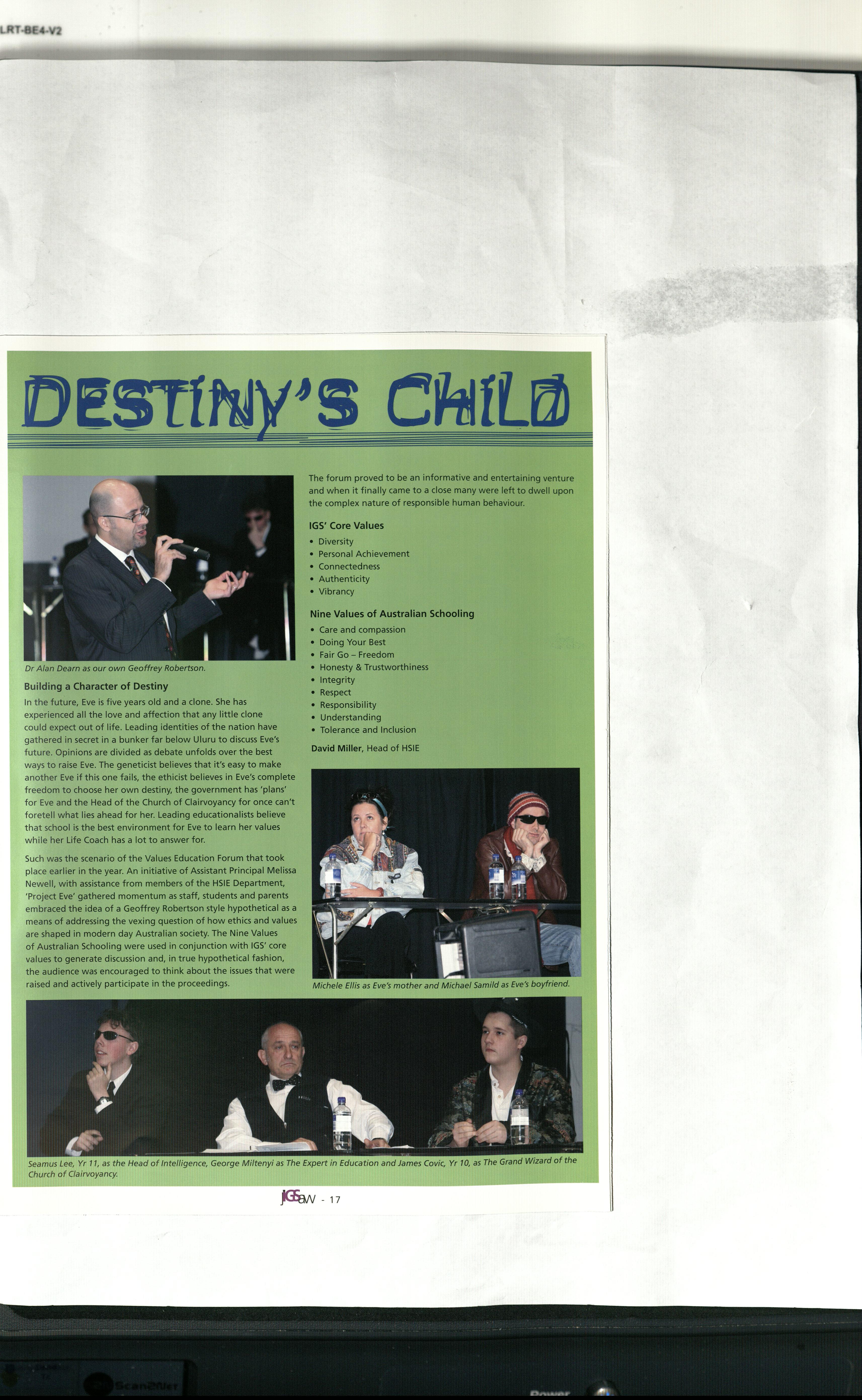
Building a Character of Destiny
In the future, Eve is five years old and a clone. She has experienced all the love and affection that any little clone could expect out of life. Leading identities of the nation have gathered in secret in a bunker far below Uluru to discuss Eve's future. Opinions are divided as debate unfolds over the best ways to raise Eve. The geneticist believes that it's easy to make another Eve if this one fails, the ethicist believes in Eve's complete freedom to choose her own destiny, the government has 'plans' for Eve and the Head of the Church of Clairvoyancy for once can't foretell what lies ahead for her. Leading educationalists believe that school is the best environment for Eve to learn her values while her Life Coach has a lot to answer for.
Such was the scenario of the Values Education Forum that took place earlier in the year. An initiative of Assistant Principal Melissa Newell, with assistance from members of the HSIE Department, 'Project Eve' gathered momentum as staff, students and parents embraced the idea of a Geoffrey Robertson style hypothetical as a means of addressing the vexing question of how ethics and values are shaped in modern day Australian society. The Nine Values of Australian Schooling were used in conjunction with IGS' core values to generate discussion and, in true hypothetical fashion, the audience was encouraged to think about the issues that were raised and actively participate in the proceedings.
The forum proved to be an informative and entertaining venture and when it finally came to a close many were left to dwell upon the complex nature of responsible human behaviour.
IGS' Core Values
• Diversity
• Personal Achievement
• Connectedness
• Authenticity
• Vibrancy
Nine Values of Australian Schooling
• Care and compassion
• Doing Your Best
• Fair Go- Freedom
• Honesty & Trustworthiness
• Integrity
• Respect
• Responsibility
• Understanding
• Tolerance and Inclusion
David Miller, Head of HSIE
Dr Alan Dearn as our own Geoffrey Robertson.
Michele Ellis as Eve's mother and Michael Samild as Eve's boyfriend
Seamus Lee, Yr 11, as the Head of Intelligence, George Miltenyi as The Expert in Education and James Covic, Yr 10, as The Grand Wizard of the Church of Clairvoyancy.
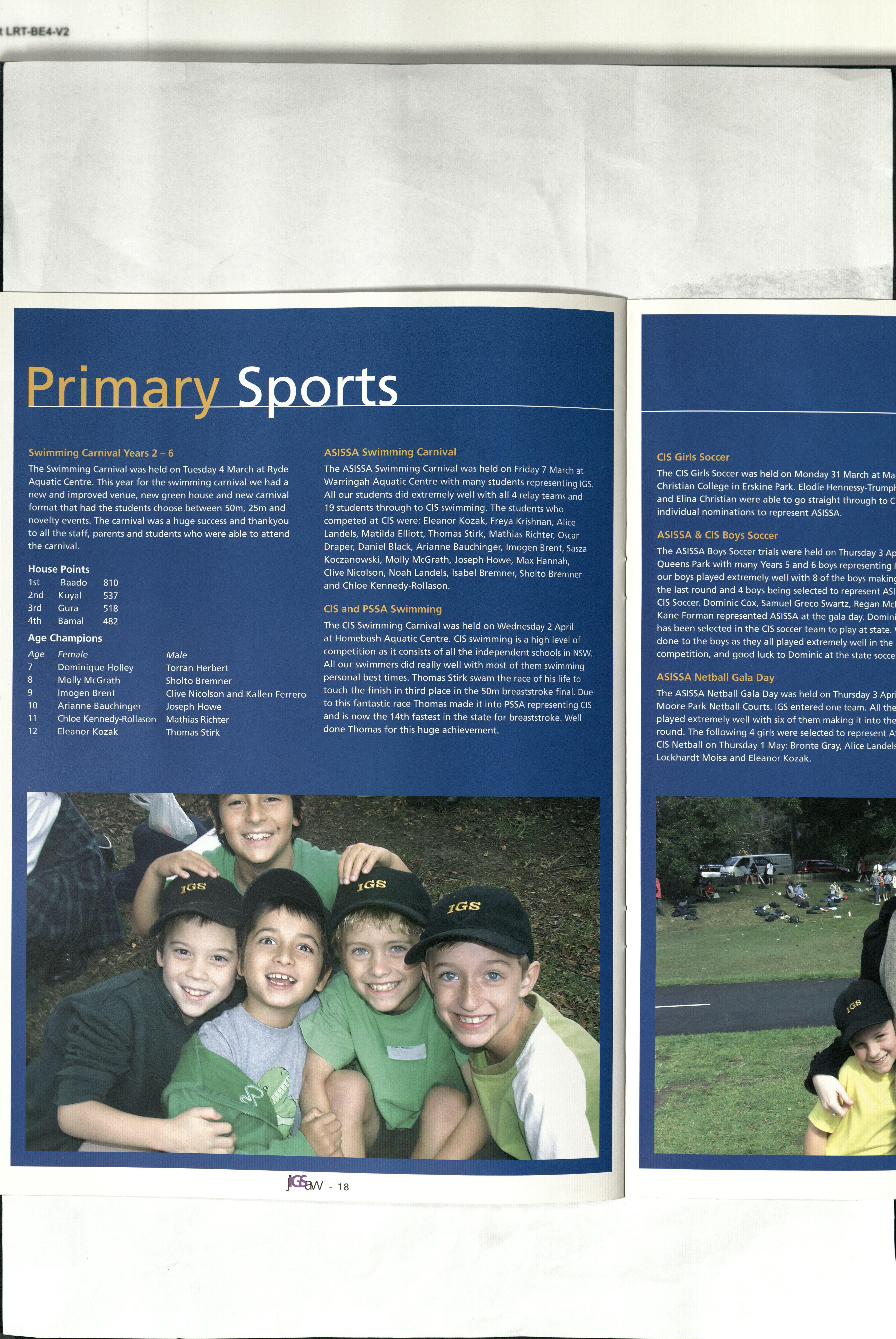
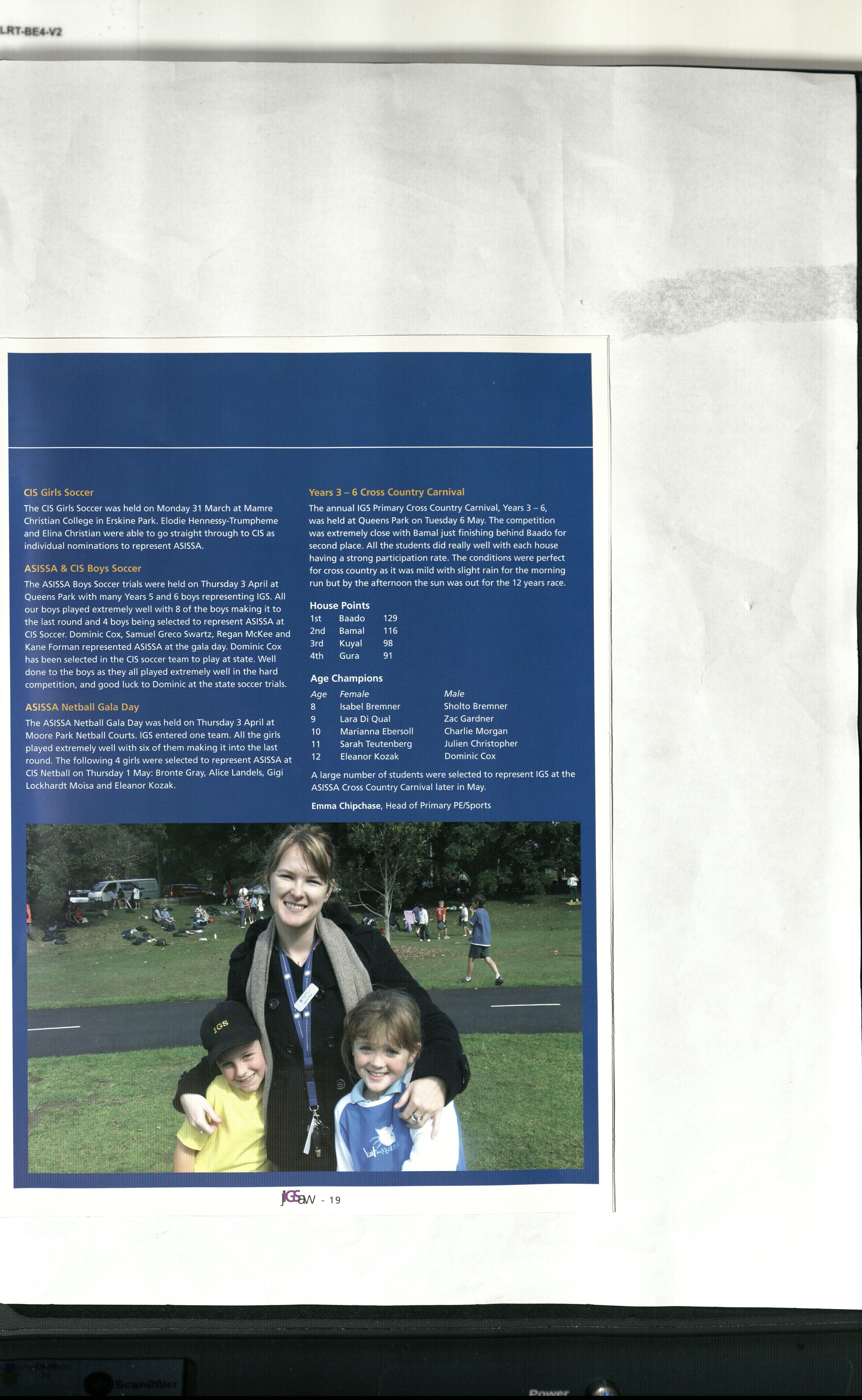
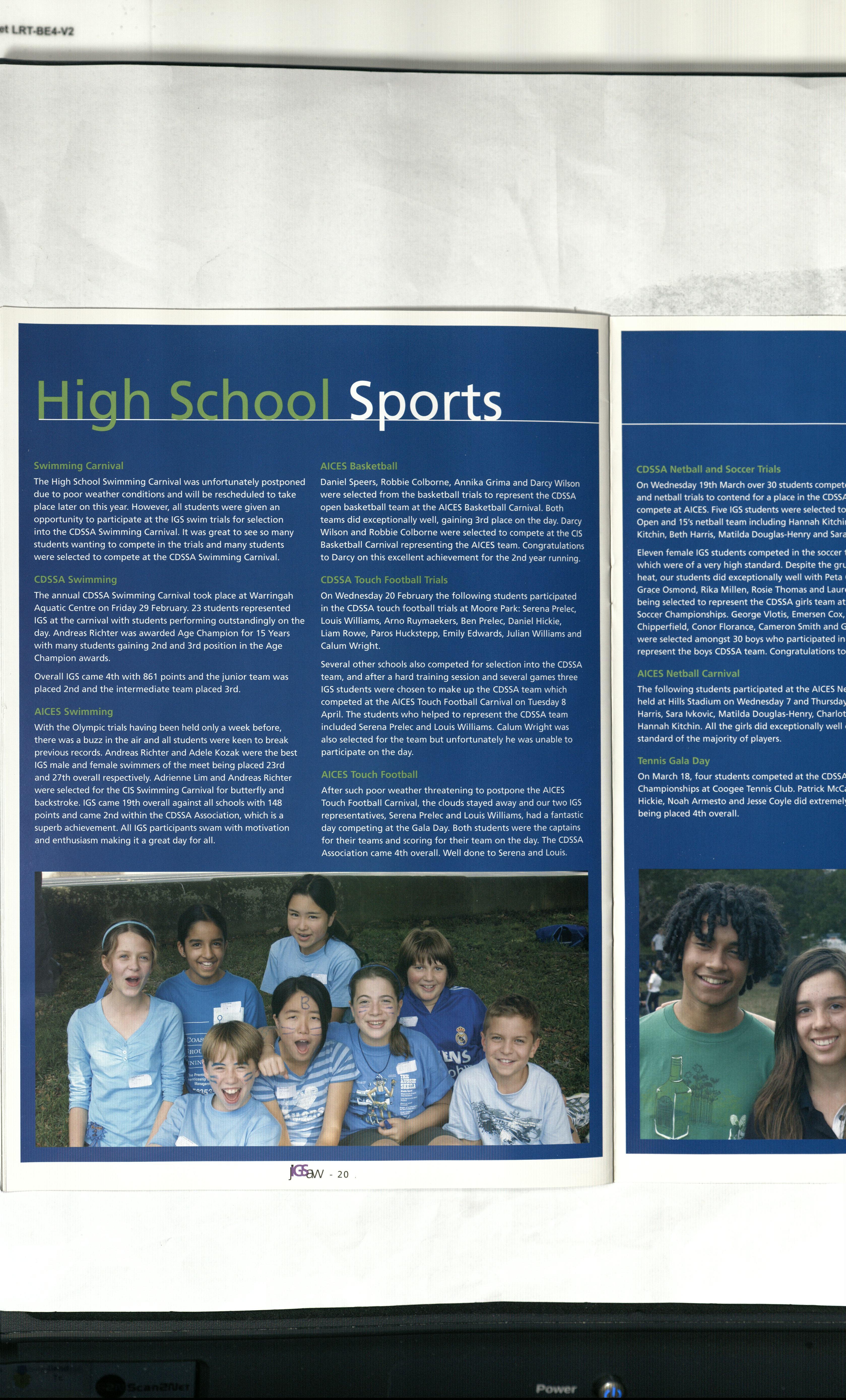
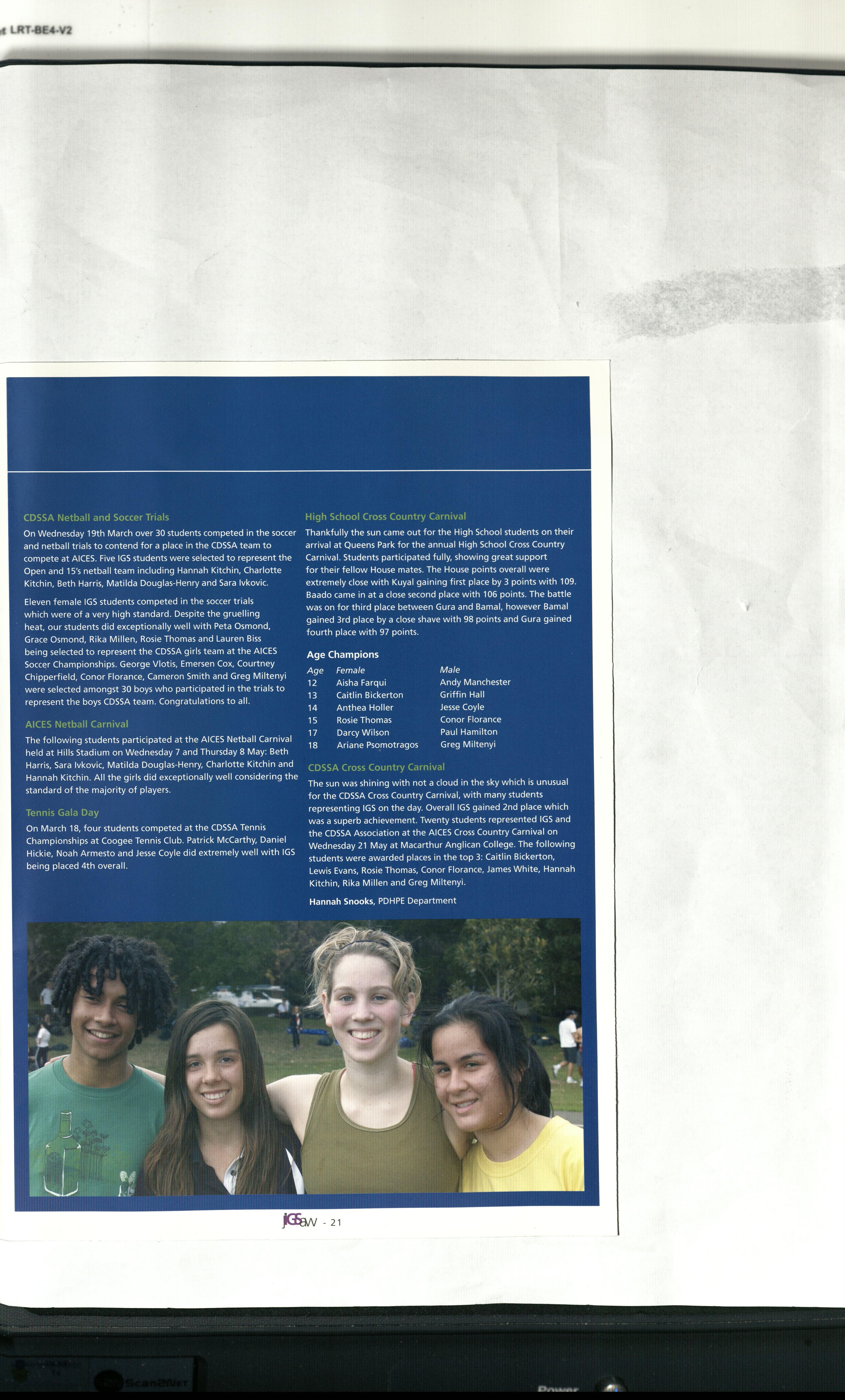
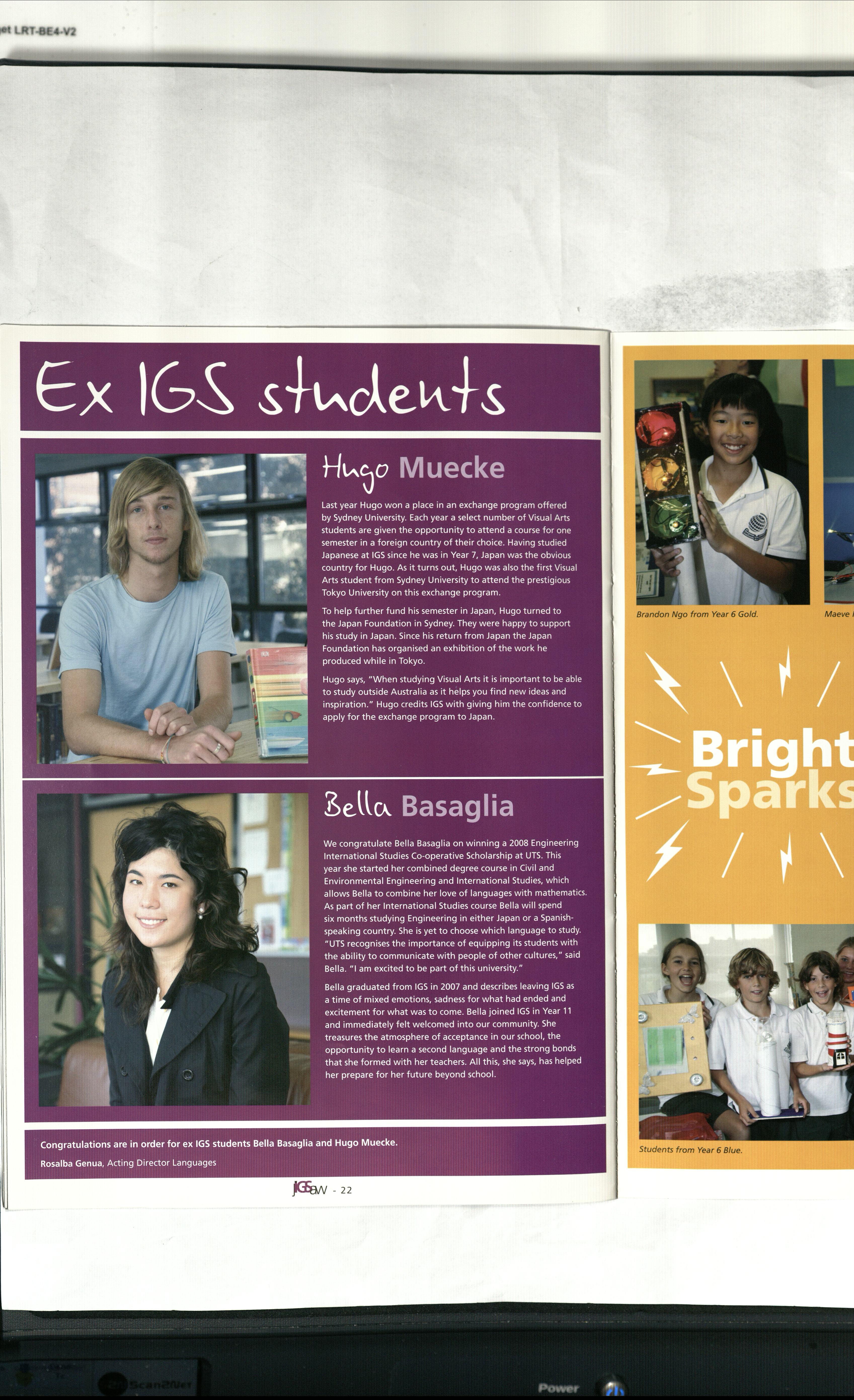
Congratulations are in order for ex IGS students Bella Basaglia and Hugo Muecke.
Rosalba Genua , Acting Di rector Languages
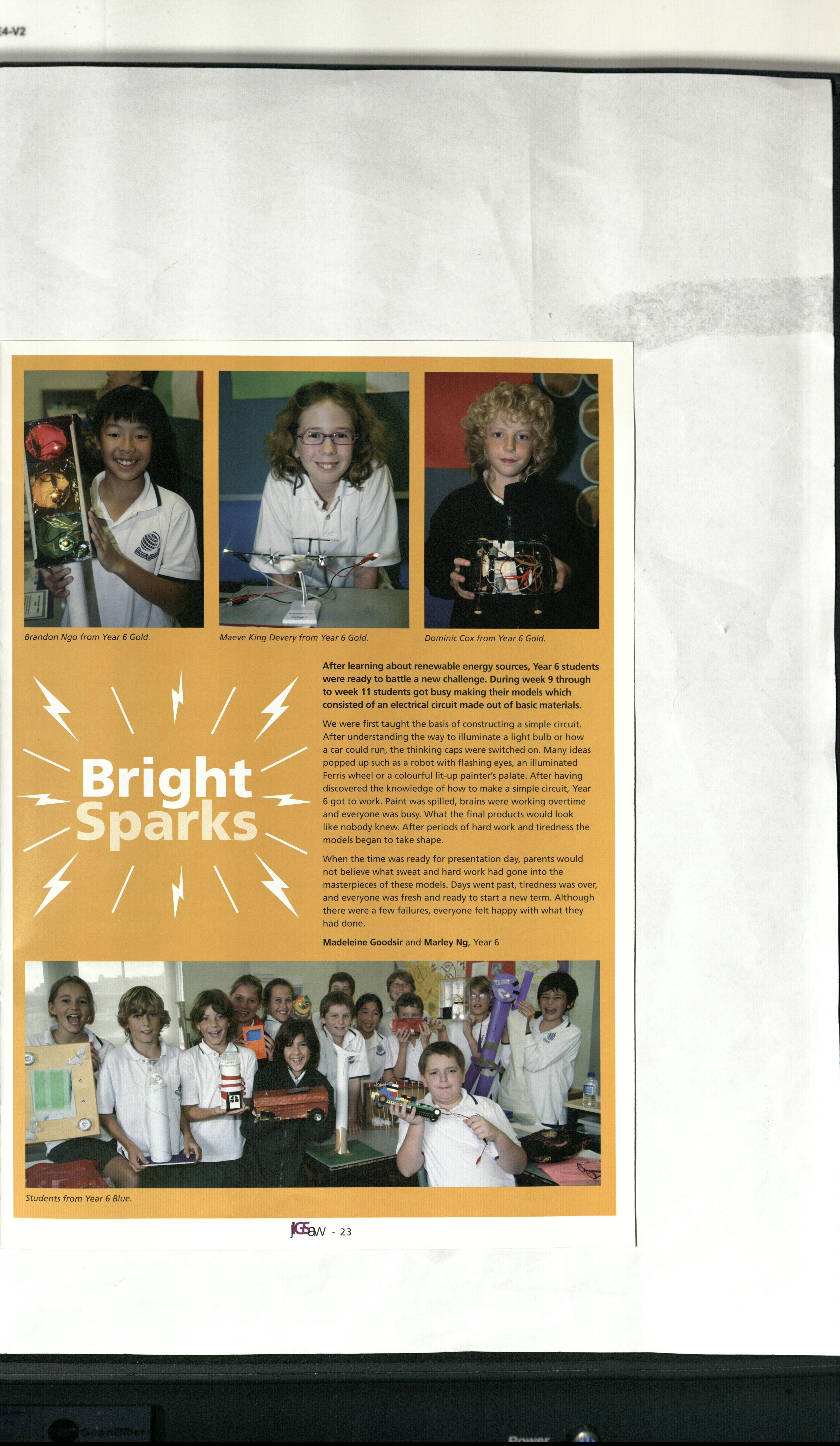
After learning about renewable energy sources, Year 6 students were ready to battle a new challenge. During week 9 through to week 11 students got busy making their models which consisted of an electrical circuit made out of basic materials.
We were first taught the basis of constructing a si mple circuit. After understanding the way to illuminate a light bulb or how a car could run, the thinking caps were switched on Many i deas popped up such as a robot with flashing eyes, an illuminated Ferris wheel or a colourful lit-up painter 's palate. After having discovered the knowledge of how to make a simple circu it, Year 6 got to work Paint was spilled, brains were working overt i me and everyone was busy. What the final products would look like nobody knew After periods of hard work and tiredness the models began to take shape
When the time was ready for presentation day, parents would not believe what sweat and hard work had gone into the masterpieces of these models. Days went past, t i redness was over, and everyone was fresh and ready to start a new term. Although there were a few failures, everyone felt happy with what they had done.
Madeleine Goodsir and Marley Ng, Year 6
Brandon Ngo from Year 6 Gold.
Maeve King Devery from Year 6 Gold
Dom i nic Cox from Year 6 Gold
